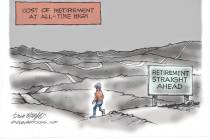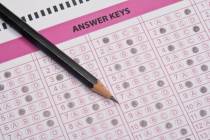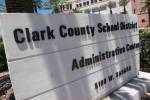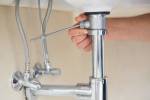Schools blame game
The consensus is that Nevada isn't a very good place to get a public education. Regardless of individual success stories, we are generally unhappy with what's happening, or not happening, in the schools here.
But opinions differ widely on who to blame for this bleak state of affairs.
Jim Rogers, chancellor of the Higher Education System of Nevada, recently targeted lousy parents as a key reason for lack of student success. In his State of the System speech last week, Rogers addressed parents directly:
"Your only relationship with the education system is to ship your unprepared kids to school, not with expectation of success, but with the demand that an education system, inadequately funded, develop and/or repair children that you as a parent did not prepare for school or support while your children attended school."
Rogers urged parents to "instill in your children a desire to learn, a discipline of hard work and a willingness to postpone instant gratification for their longer-term good. ... Your responsibility does not stop as they walk out the door to catch the bus."
Rogers' pointed comments drew criticism from a few state Republican leaders, who prefer to blame the "government-run education system" rather than Nevada's saintly parents.
There's no question Nevada has some parents who do exactly what Rogers recommends. Their kids earn A's in school, go on to college and develop successful careers.
But Rogers has nothing to apologize for. Because, sad to say, Nevada has an unusually large pool of parents who don't care about their children's education, whose kids do poorly in school, drop out and get into trouble or struggle to find satisfying work because they don't have the skills to land a good job, let alone a career. Ask any teacher, and he or she will recite a litany of horror stories, ranging from apathetic parents to overbearing ones who blame anybody but themselves for kids who act up or can't make the grade.
Of course, what happens in the classroom is also crucial. A recent Review-Journal poll of business owners and managers found widespread dissatisfaction with the quality of job applicants coming out of the Clark County School District.
A lot of young people entering the job market are deficient in reading, writing and arithmetic, according to the poll. What's more, the kids lack the verbal communication skills needed to perform quality customer service or any task that requires talking with people.
"Our public schools are consistently in the bottom five of the country in every article I read," Charles Jack, a commercial real estate appraiser, wrote in response to the Review-Journal survey. "That's just a disgrace. How do 90 percent of the kids in our high schools fail an algebra-competency exam?"
The business owners and managers surveyed said "stricter accountability of teachers and administrators" is most needed to rectify this problem. And just as Rogers is generally right about parents, businesses are generally right about the schools.
I've written many times over the years about my mostly positive experiences with two children coursing through the public schools here. They have had mostly good teachers and very few problems.
But my experience, as I have learned, is not necessarily representative in a district with more than 300,000 students and 20,000 teachers. My kids -- largely to my wife's credit, no doubt -- are straight-A students who take advanced classes.
In other parts of the valley, I know, the public education experience can be quite different. Some administrators and teachers don't do a good job. With tens of thousands of educators working in the district, there are bound to be bad apples.
These folks must be weeded out, plain and simple. Exactly how this is to be accomplished, I'm not sure. I know you can't evaluate teachers simply by looking at student test performance. But innovative forms of accountability are desperately needed.
So, bad parents contribute to the problem, and bad administrators and teachers contribute to the problem. What about politicians? We can't let them off the hook, because they are the third leg on which our wobbly education system depends.
Nevada politicians have a long history of neglecting education. Gov. Jim Gibbons' proposed cuts this year are nothing short of irresponsible, but he's hardly the first politician to shortchange Nevada schools. Some state lawmakers talk a good game, but as each legislative session in Carson City winds down in late May, education inevitably comes up short.
Critics suggest that no matter how many tax dollars are allocated for schools, the "educrats" will not be satisfied, that there'll never be enough money to slake their thirst.
That, in a sense, is true. Education advocates will always seek to increase school funding. But the fact is, Nevada education has never enjoyed anything resembling sufficient funding. We've never had the opportunity to see what we might be able to accomplish if our schools had sufficient funding.
Fixing Nevada education requires more money, not slashing the budget. But funding is far from the only problem we face.
Geoff Schumacher (gschumacher@reviewjournal.com) is director of community publications for the Review-Journal. His column appears Friday.























